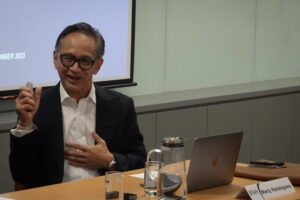Abstract
Much attention has been given to ASEAN’s predicament in navigating the geopolitical turbulence facing it in the region. However, such a plight is not unique to Southeast Asia. As the responses to the current global multiple crisis attest, few countries are able to isolate themselves from the all-pervasive geopolitical push and pull, particularly that between China-US and Russia-West. Yet, beyond expression of neutrality, and not wanting to be forced to choose, there have been little signs of coordinated and common response to the fracturing world. The Non-Alignment Movement struggles to earn relevance amidst the current complex geopolitical environment.
Countries that are not part of the geopolitical competition are simply variously described as “Global South”, “emerging powers”, “middle powers” or simply “rest of the world’; illustrating their lack of common identity, despite their similar plight. In the face of ever intensifying and widening global geopolitical competition, what are the prospects for a common or more coordinated response by such countries? What are the potential shared principles and interests that can bind countries that are determined not to be forced to choose between the geopolitical rivals? Aside from the often-expressed commitment to rules-based and norms-based international order, and rejection of bloc politics, what issues may serve as common ground for coordinated and proactive response to an increasingly fractured world? How can countries– outside the well-defined geopolitical rivals – assert and earn relevance?
About the Speaker
Marty Natalegawa was appointed as Distinguished Visiting Fellow in the S. Rajaratnam School of International Studies on 1 July 2022.
Dr Natalegawa holds a D.Phil. from the Australian National University; an M.Phil. from University of Cambridge; and a BSc (Hons) from the London School of Economics.
Dr Natalegawa served as Foreign Minister of Indonesia (2009 – 2014). Previously, he served as Permanent Representative/Ambassador of Indonesia to the United Nations (UN); Ambassador to the UK and also to Ireland. Within the Ministry of Foreign Affairs of Indonesia, among others, he served as Director General for ASEAN Cooperation and Director for International Organizations.
Within ASEAN, he has been instrumental in pushing for the ASEAN Community and was an early advocate of an ASEAN role in the Indo-Pacific through the concept of “dynamic equilibrium”. Throughout, including as Foreign Minister, he actively promoted the management and resolution of potential conflicts in the region.
Within the context of the UN, he served, among others, as President of the Security Council in November 2007 and led Indonesia’s delegation at numerous multilateral negotiations, both within the UN and beyond. He was instrumental in securing Indonesia’s ratification of the Comprehensive Nuclear Test Ban Treaty (CTBT) in 2012.
He served in the UNSG’s High Level Panel on Global Response to Health Crises and UN President of the General Assembly’s 72nd Session Team of External Advisors.
He is a member of the UN Secretary-General’s High Level Advisory Board on Mediation. He is also a member of the UN Secretary-General’s Advisory Board on Disarmament and the Board of Trustees of the United Nations Institute for Disarmament Research.
He is also presently Asia Society Policy Institute Distinguished Fellow; a member of the International Academic Advisory Committee of the Oxford Centre for Islamic Studies; the Southeast Asia Advisory Board of the Centre for Strategic and International Studies (CSIS – Washington, D.C.); Global Advisory Committee of the Jeju Forum; University of Western Australia’s Public Policy Institute Advisory Board; the Board of Directors of the Global Centre for Pluralism, Ottawa; and is a Prominent Research Scholar of the Bank of Indonesia Institute. He is also the Chairperson of the Asia Pacific Leaders Network (APLN) for nuclear non-proliferation and disarmament.
He is the author of “Does ASEAN Matter? A view from Within” (ISEAS Publishing – 2018).
Dr Natalegawa has been cited as “one of the most respected foreign policy and international security thinkers of his generation, both within Indonesia, in South-east Asia, and in the broader Asia-Pacific region”.



 Add to Google calendar
Add to Google calendar
 Add to Outlook calendar
Add to Outlook calendar


